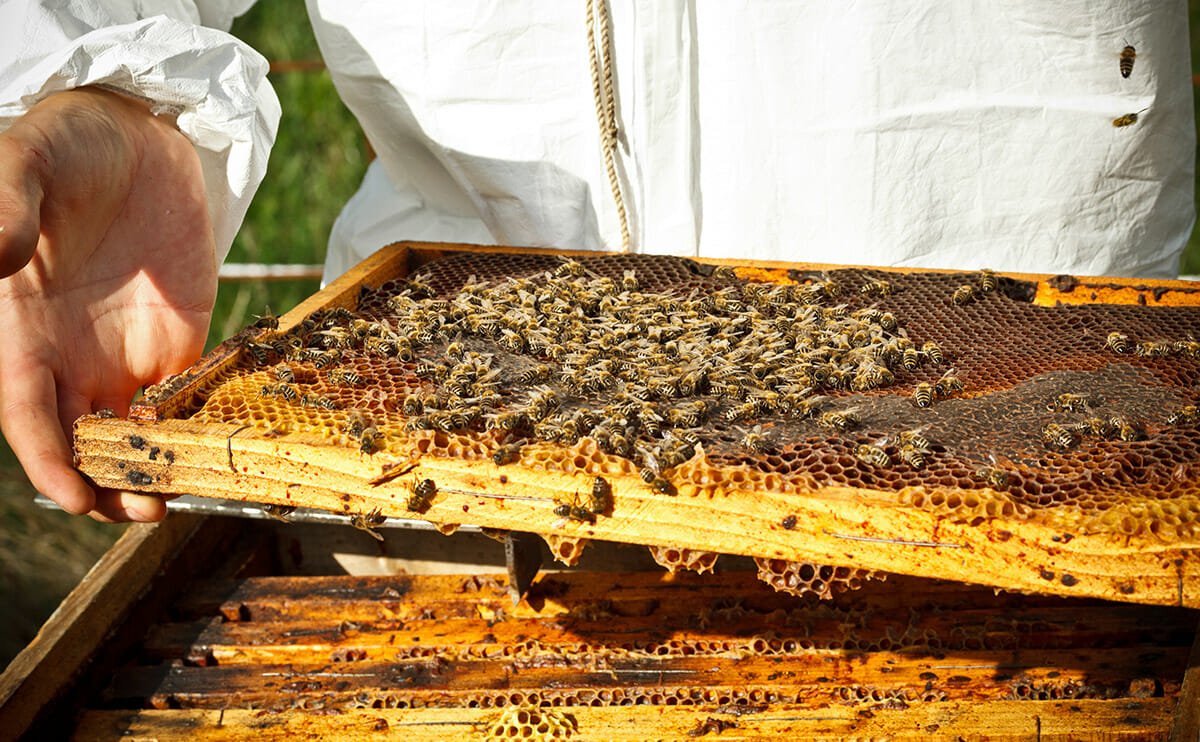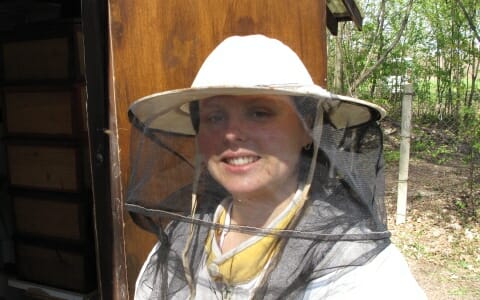A Bee Hive Grows in Berlin
Germany is in throes of a local honey revival, and we talk to one woman leading the charge.
A Bee Hive Grows in Berlin
Germany is in throes of a local honey revival, and we talk to one woman leading the charge.

Before the fall of the Berlin Wall, the country’s Communist government subsidized honey production and exported whatever it produced, leaving East Germans like Mueller with coarsely crystallized, honey-flavored sugar.
Now, Germany is in throes of a honey revival, and people like Mueller are one reason why. In 2008, she founded Berliner Honig, an association of local beekeepers that is now producing single-source honey and changing the way the German community thinks about honey. Berliner Honig is testament both to Mueller’s past and her passion for what she couldn’t have as a child. The association brings together local beekeepers that produce single-course honey, which is 100 percent natural – no filters or mixtures in sight.
But Mueller’s impetus was time she spent near Baltimore while working as a computer programmer. It was there she discovered local artisanal honey.
“You could say I fell in love with the taste,” she says. “Soon artisanal honey became a staple in my kitchen.”
When she got back to Berlin, Mueller says she expected to find a good local honey at the supermarket. After all, East Germany was long gone. But she was disappointed. Instead, she learned that 80 percent of the honey consumed in Germany is now imported, ironic since Germans are among Europe’s largest consumers of honey (6 pounds per person per year). Still, the majority of German honey was being exported, with cheaper local honey imported from Portugal, Mexico, Argentina, and even China.
Worse, the honey coming in wasn’t much good. “As a rule the imported honey is actually mixtures of different honeys from EU and Non-EU countries,” says Mueller. There was no comparing the imported honey to the artisanal kind she’d grown accustomed to in the U.S. The imports, she says, “lacked flavor and aroma.”

Moreover, the way honey is marketed to Germany consumers is a race to the bottom. Quality is low and prices high. Honey branding and marketing tends to favor large, importing packers, such as Tuchel & Sohn, Breitsamer & Ulrich, Walter Lang Honigimport, or Gepa Fair Handelshaus.
This makes it difficult for customers to distinguish between local or imported honey. Companies like Tuchel & Sohn are adept at blending and filtering honeys from all over the world, mixing local and imported honey. It was the current state of honey and the lack of knowledge available to the public that prompted Annette’s decision to begin Berliner Honig, whose goal is to have more bees and ensure pollination by increasing local honey production.
Today, you can find Berliner Honig’s trademark bottles at big chain German supermarkets such as Karstadt, as well as in small organic Biomarkts and cafes, including the British-run Hudson Cakes in Kreuzberg. The push to support local food is part of a growing sentiment of German pride in local food culture, including a strong desire to reconnect with the land and its producers.
Berliner Honig is evidence of this trend, but also highlights the past and exposes the current state of honey. If the company is successful, it will be because they can use honey to re-educate people about taste, history, and the politics of food, both in Germany and abroad.
Meanwhile, Mueller continues to tend her hives. Bees are buzzing again in Berlin, and that’s victory enough for now.
This is part of Modern Farmer’s Bee Week. Click here to see everything from our entire week of coverage all things honeybee. Bee Week: It’s like Shark Week, but with bees.
Follow us
This work is licensed under a Creative Commons Attribution-NoDerivatives 4.0 International License.
Want to republish a Modern Farmer story?
We are happy for Modern Farmer stories to be shared, and encourage you to republish our articles for your audience. When doing so, we ask that you follow these guidelines:
Please credit us and our writers
For the author byline, please use “Author Name, Modern Farmer.” At the top of our stories, if on the web, please include this text and link: “This story was originally published by Modern Farmer.”
Please make sure to include a link back to either our home page or the article URL.
At the bottom of the story, please include the following text:
“Modern Farmer is a nonprofit initiative dedicated to raising awareness and catalyzing action at the intersection of food, agriculture, and society. Read more at <link>Modern Farmer</link>.”
Use our widget
We’d like to be able to track our stories, so we ask that if you republish our content, you do so using our widget (located on the left hand side of the article). The HTML code has a built-in tracker that tells us the data and domain where the story was published, as well as view counts.
Check the image requirements
It’s your responsibility to confirm you're licensed to republish images in our articles. Some images, such as those from commercial providers, don't allow their images to be republished without permission or payment. Copyright terms are generally listed in the image caption and attribution. You are welcome to omit our images or substitute with your own. Charts and interactive graphics follow the same rules.
Don’t change too much. Or, ask us first.
Articles must be republished in their entirety. It’s okay to change references to time (“today” to “yesterday”) or location (“Iowa City, IA” to “here”). But please keep everything else the same.
If you feel strongly that a more material edit needs to be made, get in touch with us at [email protected]. We’re happy to discuss it with the original author, but we must have prior approval for changes before publication.
Special cases
Extracts. You may run the first few lines or paragraphs of the article and then say: “Read the full article at Modern Farmer” with a link back to the original article.
Quotes. You may quote authors provided you include a link back to the article URL.
Translations. These require writer approval. To inquire about translation of a Modern Farmer article, contact us at [email protected]
Signed consent / copyright release forms. These are not required, provided you are following these guidelines.
Print. Articles can be republished in print under these same rules, with the exception that you do not need to include the links.
Tag us
When sharing the story on social media, please tag us using the following: - Twitter (@ModFarm) - Facebook (@ModernFarmerMedia) - Instagram (@modfarm)
Use our content respectfully
Modern Farmer is a nonprofit and as such we share our content for free and in good faith in order to reach new audiences. Respectfully,
No selling ads against our stories. It’s okay to put our stories on pages with ads.
Don’t republish our material wholesale, or automatically; you need to select stories to be republished individually.
You have no rights to sell, license, syndicate, or otherwise represent yourself as the authorized owner of our material to any third parties. This means that you cannot actively publish or submit our work for syndication to third party platforms or apps like Apple News or Google News. We understand that publishers cannot fully control when certain third parties automatically summarize or crawl content from publishers’ own sites.
Keep in touch
We want to hear from you if you love Modern Farmer content, have a collaboration idea, or anything else to share. As a nonprofit outlet, we work in service of our community and are always open to comments, feedback, and ideas. Contact us at [email protected].by Molly Hannon, Modern Farmer
May 9, 2013
Modern Farmer Weekly
Solutions Hub
Innovations, ideas and inspiration. Actionable solutions for a resilient food system.
ExploreExplore other topics
Share With Us
We want to hear from Modern Farmer readers who have thoughtful commentary, actionable solutions, or helpful ideas to share.
SubmitNecessary cookies are absolutely essential for the website to function properly. This category only includes cookies that ensures basic functionalities and security features of the website. These cookies do not store any personal information.
Any cookies that may not be particularly necessary for the website to function and are used specifically to collect user personal data via analytics, ads, other embedded contents are termed as non-necessary cookies.